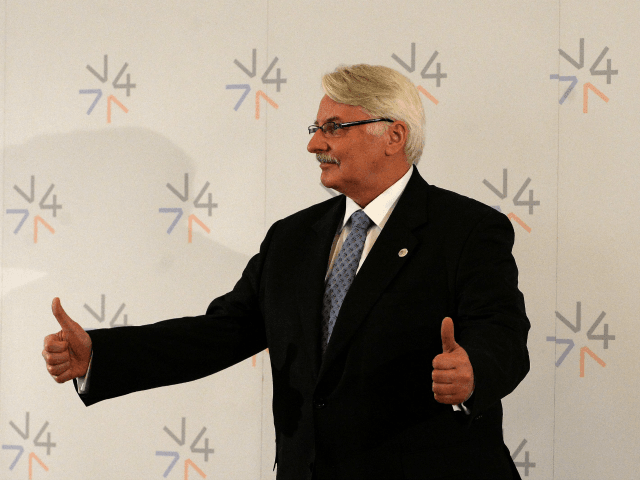WARSAW, Poland (AP) — The Polish government on Thursday rejected a critical assessment of its first months in office from the European Union, arguing that the bloc’s complaints were unauthorized and non-binding.
A day after the European Commission slammed some of the conservative government’s moves, which have paralyzed the country’s Constitutional Tribunal and triggered international censure and domestic opposition against the ruling Law and Justice party, Foreign Minister Witold Waszczykowski (pictured above) poured scorn on the EU assessment.
“What right the Commission has to judge anything?” Waszczykowski said on state radio, just hours before meeting with EU foreign affairs chief Federica Mogherini. “It is not binding for us. We treat this document that has arrived as an opinion, as a suggestion.”
Waszczykowski’s defiant comments were in step with the right-wing government’s approach to the EU since it came to power six months ago, promising to improve the way the country is run, help the underprivileged and raise Poland’s profile in the 28-nation bloc. It’s been at odds with a lot of EU policy over that time, including on issues related to constitutional matters, migrants and reforming the EU.
The ruling party leader, Jaroslaw Kaczynski, claims Poland needs to defend its sovereignty from the EU’s domination — even though he also believes that Britain should vote to remain in the EU in its June 23 referendum.
Under the ruling conservative Law and Justice party, Poland has been insisting on more independence for EU member nations on issues like legislation, the economy and refugee policy. It also has been demanding more EU solidarity on military and energy security in the face of the conflict in neighboring Ukraine, where Russia is backing separatists.
Poland has defied EU plans to assign migrant quotas to specific countries, citing security concerns and the fact that it has accommodated hundreds of thousands of Ukrainians.
The government, which bases its popularity on social benefits and national Catholic traditions, insists the rapid changes it has made to Poland’s constitutional court, its state media and police powers are Poland’s own business and should not concern EU leaders. It says it draws authority from voters in Poland, not from officials in Brussels, the EU headquarters.
Such statements have produced a sense of inflated national pride among the ruling party’s voters, largely those who feel left behind amid Poland’s EU-fueled transformations and growth. The government statements also support displays of nationalism by radical groups, like the recent anniversary celebrations by the National Radical Camp in the eastern city of Bialystok.
Opinion polls show support of around 35 percent for the ruling party, way above any opposition group.
Kaczynski, the party’s powerful head, recently accused EU leaders of having “no respect” for Poland’s sovereignty or for the Poles themselves.
He says the “rule of law” procedure the EU is now applying to Poland due to the conflict around the country’s Constitutional Tribunal is not rooted in the EU treaties but some “invented” procedure. He has warned that if Poland faces any EU sanctions — such as losing its EU voting rights — it will not hesitate to take the case to the European Justice Tribunal.
The Law and Justice statements come in sharp contrast to the unity that Poland had with Brussels and Berlin under eight years of its previous liberal government whose head, Donald Tusk, is now the European Council president. Kaczynski said recently that Poland will back Tusk for another EU term on condition he does not hurt Poland’s interests or back the opposition in Poland.
The EU’s main criticism of Poland centers on steps taken by the governing party to gain control over the Constitutional Tribunal, the country’s highest court, which has the power to block legislation pushed by the government. If Poland fails to resolve the internal stalemate, it could potentially lose its EU voting rights.
Mogherini, the EU foreign affairs chief, was in Warsaw on Thursday to meet with Polish President Andrzej Duda, Prime Minister Beata Szydlo and Waszczykowski for talks on EU policy, Russia and the NATO summit in Warsaw next month.
Despite the foreign minister’s strong comments, Mogherini was diplomatic. She said Poland is a “very strong member” of the EU family with strong convictions about its membership.
“The fact that Poland is contributing to the European Union in such a determined way is something that we appreciate very much,” Mogherini said.
(By Monika Scislowska)

COMMENTS
Please let us know if you're having issues with commenting.